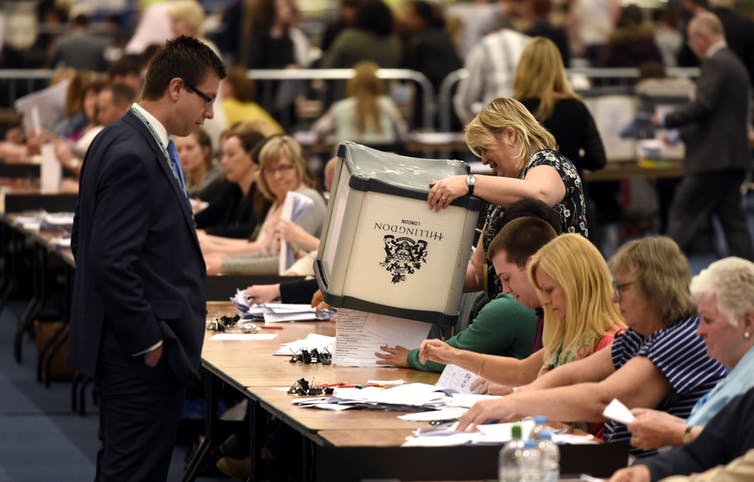Professor Justin Fisher is Head of Social and Political Sciences at Brunel University London
<p>Ever since the 2019 UK election was called I’ve been inundated with enquiries from home and abroad about whether Boris Johnson, the prime minister, could lose his parliamentary seat of <a href="https://democraticdashboard.com/constituency/uxbridge-and-south-ruislip">Uxbridge & South Ruislip</a>.</p>
<p>The answer is “well, obviously” since it is, of course, possible – and made even more possible by some of the surprises we’ve seen in <a href="https://journals.sagepub.com/doi/full/10.1177/0032321718764800">recent elections</a>. But thinking something is possible is very different from saying it is likely, and as things stand, much of the evidence seems to point to it being a rather unlikely outcome.</p>
<p>At this point, I should confess some self-interest: Brunel University London sits in the constituency and Johnson’s principal opponent for the seat is a graduate of our department. Not only that, the election declaration will be on Brunel’s campus, so if Johnson did lose his seat, the electoral story of this decade (and many more) would take place at our university.</p>

Ballots are counted at Brunel University in 2015. PA
<p>So, why do people think that Johnson could lose his seat? Well, his lead over the second placed Labour candidate in 2017 was just over 5,000 votes – down from nearly 10,700 in 2015. And, unlike his predecessor, <a href="https://www.parliament.uk/biographies/lords/lord-randall-of-uxbridge/209">John Randall</a>, Johnson is not a local man and has few ties to the constituency – localness being something <a href="https://journals.sagepub.com/doi/10.1177/1354068818823443">we know tends to help candidates</a>. </p>
<p>His principal opponent, <a href="https://whocanivotefor.co.uk/person/47463/ali-reza-milani">Ali Reza Milani</a> is not just a graduate of Brunel, but was president of the Union of Brunel Students – so we know he’s good at winning the student vote. And with the seat being home to the university, there is a view that student votes could make all the difference, given that the election takes place during term time.</p>
<p>On the face of it, that’s a potent cocktail which would make the <a href="https://www.youtube.com/watch?v=BVvWE6V9ulE">Michael Portillo moment in 1997</a> look like small beer.</p>
<p>The trouble is, the counter evidence is pretty strong. The constituency has a <a href="https://www.bbc.co.uk/news/politics/constituencies/E14001007">long history of Conservative support</a>. It has returned a Conservative MP at every election since 1970. Unlike most of London, Uxbridge resisted the “Tony Blair tide” in 1997 and was <a href="http://www.election.demon.co.uk/1997LB.html">one of only 11</a> (out of 74) seats in the city that remained Conservative. Indeed, that election represented Labour’s highest vote share in the seat since the last time the party won it (in 1966). Again unlike much of London, a majority in Uxbridge <a href="https://www.standard.co.uk/news/politics/london-eu-referendum-results-the-five-london-boroughs-which-bucked-the-trend-and-backed-brexit-a3279836.html">voted Leave</a> in the 2016 Brexit referendum.</p>
<p>It’s also worth nothing that while Johnson’s majority in 2017 was somewhat down on 2015, it still represented at 11% lead, outside what is usually regarded as a marginal seat.</p>
<p>The evidence over the past 30 or so years also shows that constituents <a href="https://onlinelibrary.wiley.com/doi/full/10.1111/1467-9248.12048">rather like</a> having a prime minister as their MP. On only three occasions since the 1987 election have prime ministers seen their own constituency vote share fall. Most dramatically, <a href="https://theconversation.com/uk/topics/john-major-26500">John Major’s</a> fell by nearly 10% in 1997 (when Blair’s Labour Party won a landslide), while <a href="https://www.theguardian.com/society/2005/may/06/politics.ukgeneralelection2005">Blair</a> lost 6% of his vote in 2005 (in the aftermath of the Iraq War). The third was Theresa May, <a href="https://www.bbc.co.uk/news/politics/constituencies/E14000803">who lost just 1% of her vote</a> in 2017. In all other cases (Cameron, Brown, Blair in 2001, Major in 1992 and Thatcher), constituents in the prime minister’s seat improved the vote share of their MP.</p>
<h2>Not all students vote Labour – or vote here</h2>
<p>What then of the student vote? There are two assumptions that need challenging, here – that the student vote is overwhelmingly behind one party and that the vast majority of students are registered to vote in the constituency.</p>
<p>Labour is certainly popular among students, but Brunel has a long history among its student body of being rather pluralist in its political views, with a notably strong Conservative society. So there’s no reason to suspect that student votes will line up solidly behind the Labour candidate. On the latter, like many universities in London, a large number of Brunel’s students commute. In Brunel’s case, around 51% of home and EU students travel in to campus from elsewhere. That means that large numbers of these students will live and be registered to vote in different constituencies, so couldn’t vote in Uxbridge & South Ruislip even if they wanted to.</p>
<p>So, Johnson losing his seat is obviously possible, but it doesn’t look that likely. Jeremy Corbyn’s <a href="https://theconversation.com/uk/topics/labour-party-5886">Labour Party</a> does not <a href="https://www.bbc.co.uk/news/uk-politics-49798197">presently look like</a> it has the electoral momentum that Blair’s Labour party did in 1997 and of course, even then, the Conservatives held on to the seat.</p>
<p>For sure, it would be a truly remarkable event if it happened, but the truth about the targeting of high-profile candidates is that we recall the few occasions when it is successful, and forget that many more instances when it has utterly failed. “Were you up for Johnson?” may yet be the phrase many utter for decades to come when thinking about what happened on the night of the 2019 election, but my suspicion is that any electoral shocks that may happen on election night will unfold elsewhere.</p>
<p>This article is republished from <a href="http://theconversation.com">The Conversation</a> under a Creative Commons license. Read the <a href="https://theconversation.com/the-view-from-uxbridge-where-students-are-trying-to-unseat-boris-johnson-the-uk-prime-minister-127693">original article</a>.</p>
<!-- Below is The Conversation's page counter tag. Please DO NOT REMOVE. --><img src="https://counter.theconversation.com/content/127693/count.gif?distributor=republish-lightbox-basic" alt="The Conversation" width="1" height="1" style="border: none !important; box-shadow: none !important; margin: 0 !important; max-height: 1px !important; max-width: 1px !important; min-height: 1px !important; min-width: 1px !important; opacity: 0 !important; outline: none !important; padding: 0 !important; text-shadow: none !important" /><!-- End of code. If you don't see any code above, please get new code from the Advanced tab after you click the republish button. The page counter does not collect any personal data. More info: http://theconversation.com/republishing-guidelines --></p>
Reported by:
Prof Justin Fisher,
Media Relations
+44 (0)1895 268965
press-office@brunel.ac.uk